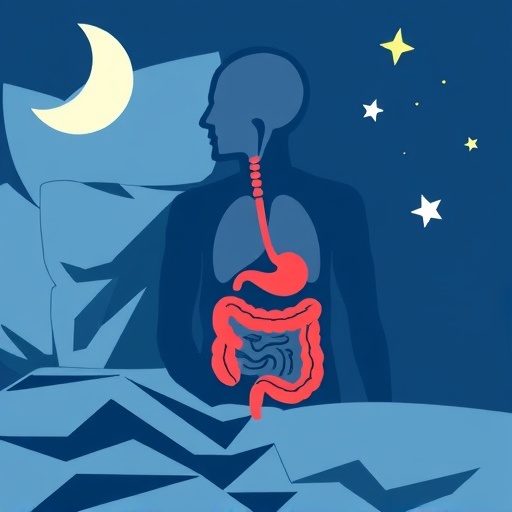Recent studies have unveiled intriguing connections between sleep deprivation, intestinal homeostasis, and the microbiome, shedding light on the complex interplay that governs our overall health. In a groundbreaking article published in the Journal of Translational Medicine, researchers Wang, Zhou, and Zheng elucidate the pivotal role of the nuclear receptor Nr1d1 in linking these phenomena. This revelation not only enhances our understanding of sleep’s impact on digestive health but also opens new avenues for potential therapeutic interventions.
Sleep deprivation has long been associated with various negative health outcomes, including impaired cognitive function, increased stress levels, and metabolic disorders. Yet, the biological mechanisms underlying these associations had remained partially elusive. The investigation led by Wang and colleagues provides clarity by focusing on Nr1d1, a receptor that monitors circadian rhythms and regulates metabolic processes. Their findings underscore that sleep deprivation does not merely disrupt our rest; it profoundly alters gut microbial composition and, consequently, intestinal function.
The gut microbiome represents a diverse community of microorganisms residing in our intestines, which play a crucial role in maintaining homeostasis. An imbalance in gut bacteria—called dysbiosis—can lead to significant health issues, including gastrointestinal diseases, obesity, and even mental health disorders. The study reveals that sleep deprivation influences the composition of the microbiota, resulting in reduced levels of key metabolites that are vital for gut health. Notably, taurine, a sulfur-containing amino acid produced by gut bacteria, emerges as a critical player in this disrupted balance.
Through rigorous experimentation, the researchers demonstrated that sleep-deprived individuals exhibited altered metabolic profiles, characterized by decreased taurine levels. This deficiency has significant implications, as taurine is known to influence various physiological processes, including bile salt formation, osmoregulation, and antioxidative defenses. The research team highlights that maintaining sufficient taurine levels may be crucial for mitigating the adverse effects of sleep deprivation on intestinal health.
Furthermore, Wang and his colleagues conducted experiments with animal models to ascertain the role of Nr1d1 in mediating these effects. The data revealed that Nr1d1 didn’t merely respond to sleep cues; it actively orchestrated the expression of genes associated with gut integrity and microbial diversity. When disrupted, these processes led to increased susceptibility to metabolic disturbances linked to sleep deprivation. This connection between Nr1d1 and gut health positions it as a potential target for therapeutic strategies aimed at improving outcomes for those experiencing sleep-related ailments.
Interestingly, the findings raise questions about the broader implications of these biological connections. As societies grapple with increasing rates of sleep disorders and stress, the cascading effects on gut health and overall wellness could have significant public health ramifications. Interventions aimed at enhancing sleep quality could potentially restore gut microbiota balance, thereby alleviating some of the metabolic dysfunctions associated with chronic sleep deprivation.
The implications of this research extend beyond academic interest; they may inform new public health policies and clinical practices. For example, health practitioners could integrate sleep hygiene education into dietary and lifestyle counseling, emphasizing the intertwined nature of sleep, microbiota, and digestive health. Additionally, the pharmacological targeting of Nr1d1 or related pathways may offer innovative approaches to improve the health of individuals suffering from both sleep deprivation and intestinal dysbiosis.
In the context of these findings, dietary strategies that promote growth of beneficial gut bacteria may also hold promise. Foods rich in prebiotics and probiotics could serve to fortify the gut microbiome against the deleterious effects of sleep loss, emphasizing the need for further research. As evidence continues to mount, it becomes increasingly clear that a holistic approach—encompassing sleep, diet, and potentially pharmacological interventions—may be crucial in safeguarding against the health impacts of sleep deprivation.
The researchers are optimistic about the future directions of this study. Given the complexity of the microbiome and its functions, future investigations could delve deeper into the specific gut bacterial species affected by sleep deprivation and their contributions to health. The prospect of personalized interventions based on individual microbiome profiles represents an exciting frontier in the field of sleep medicine.
In conclusion, the work of Wang, Zhou, and Zheng promises to reshape our understanding of the intricate connections among sleep, gut microbiota, and metabolic health. As the science continues to evolve, it is vital for both the medical community and the public to recognize the importance of sleep—not just as a period of rest, but as a crucial element of our overall health framework. The potential for new treatment strategies and public health initiatives arising from these insights is immense, paving the way for a future where sleep becomes a focus for maintaining intestinal homeostasis and holistic well-being.
By linking Nr1d1, sleep deprivation, and intestinal health through the microbiome, this research highlights an essential piece of the puzzle in understanding human health. As we continue to navigate the significance of lifestyle choices in our daily lives, the findings may eventually lead to comprehensive solutions aimed at promoting not only better sleep but also improved gut health and, consequently, enhanced quality of life.
Subject of Research: The connection between sleep deprivation, intestinal homeostasis, and microbiome-derived taurine through the nuclear receptor Nr1d1.
Article Title: Nuclear receptor Nr1d1 links sleep deprivation to intestinal homeostasis via microbiota-derived taurine.
Article References:
Wang, Z., Zhou, L., Zheng, Y. et al. Nuclear receptor Nr1d1 links sleep deprivation to intestinal homeostasis via microbiota-derived taurine.
J Transl Med 23, 1106 (2025). https://doi.org/10.1186/s12967-025-07089-8
Image Credits: AI Generated
DOI: 10.1186/s12967-025-07089-8
Keywords: Sleep deprivation, intestinal homeostasis, microbiome, taurine, Nr1d1, health effects
Tags: dysbiosis and metabolic disordersgut microbial composition changeshealth outcomes of sleep lossimpact of sleep on digestive healthintestinal homeostasis and sleepJournal of Translational Medicine research findingsNr1d1 receptor and circadian rhythmssleep and mental health connectionsleep deprivation and gut healthsleep deprivation cognitive effectstaurine and microbiome connectiontherapeutic interventions for sleep issues





